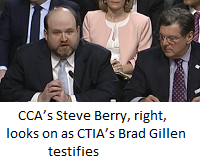U.S. concerns about Chinese telecom equipment posing an espionage threat to 5G networks was a huge concern at the Senate Commerce Committee’s first hearing of the year on Wednesday.
Michael Wessel, Commissioner, U.S.-China Economic & Security Review Commission, was careful to note he was testifying on his own behalf, and not for the Commission. He said: China “is doing all it can legally and illegally to achieve its goals.” China is poised to invest “at least” $4.5 billion in 5G, with Huawei and ZTE each getting about one-third of the market.
The U.S. “has no comparable plans.” He stressed U.S. national security agencies have concerns about the nation’s networks because Chinese companies are compelled by their law to cooperate with their government’s orders.
While large carriers don’t use gear and technology from Huawei and ZTE, many small carriers do because of their low costs. Sen. Marsha Blackburn (R-TN), said the companies “are giving it away” because they want access to the data on U.S. networks. Sen. Tom Udall (D-NM), asked Berry point-blank why so many CCA members, “continue to do business with these manufacturers.”
Berry said, “Very few of our members have that equipment in their networks. They want to do the right thing.” He noted they’re serving small rural areas with slim profit margins and the [Universal Service Fund] doesn’t credit carriers “for using equipment that costs more.”
Berry added, it’s a good thing the country is moving from 4G to 5G, meaning “we have the opportunity to secure 5G networks.” It’s also an opportunity “to cycle some of those small carriers into a more acceptable position from a national security point of view.” Many CCA members say they’re changing vendors, he noted, adding they’ve received overtures from vendors, “who recognize they dilemma they’re in.”
Sen. Jon Tester (D-MT), asked Wessel if Chinese telecom gear should be ripped out of networks now. Wessel said localities would need to conduct a network security evaluation, and funds and advice on how to do that are “spotty” between state and federal Departments of Homeland Security.
Berry said CCA thinks it can address the issue, but needs “better direction” from federal authorities. “Rip and replace is probably going to cost more” than the revenue a company derives from its network, Berry said. “My guess is Congress is going to be part of the solution.” Comments? Email Us.
By Leslie Stimson, Inside Towers Washington Bureau Chief
February 7, 2019





Reader Interactions